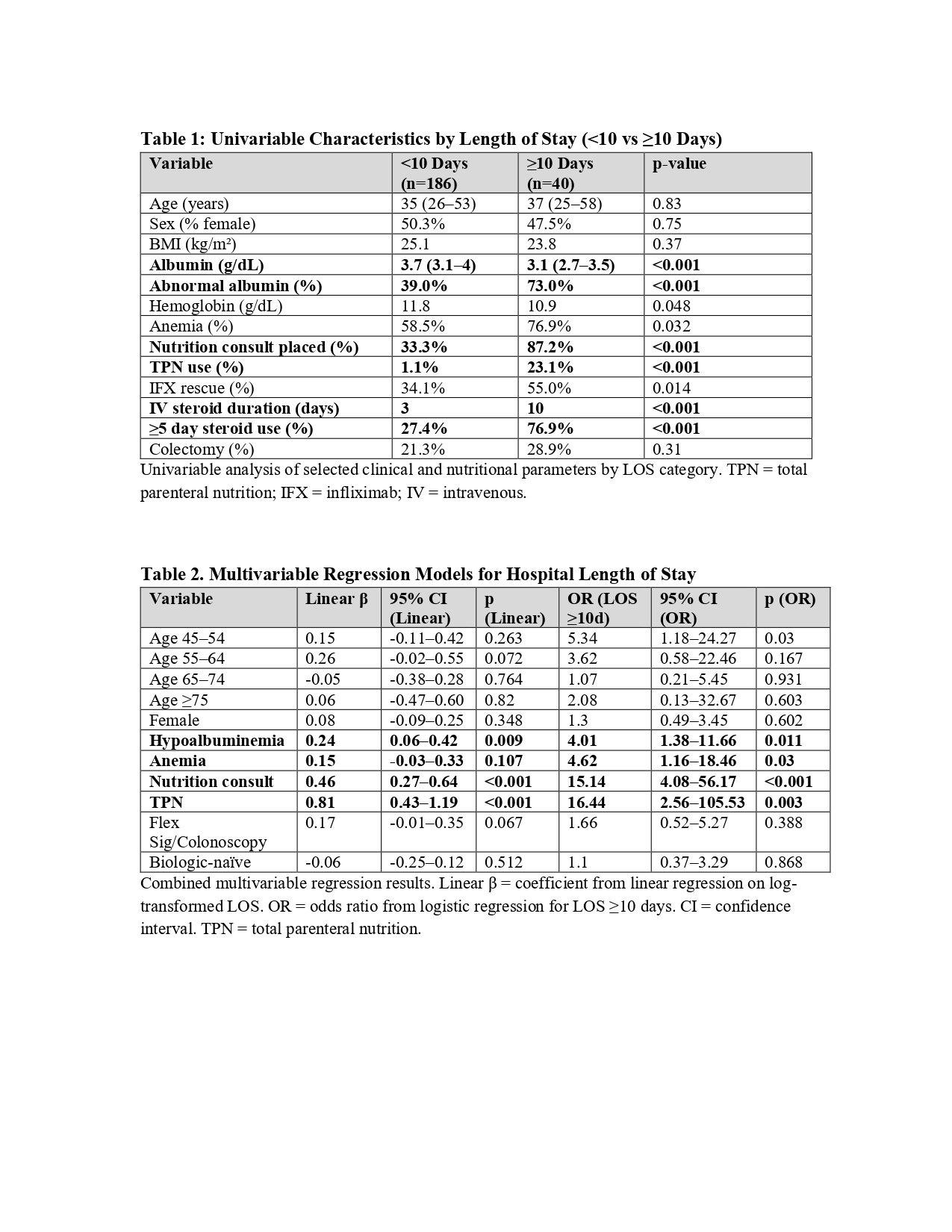Tuesday Poster Session
Category: IBD
P5384 - Clinical and Nutritional Predictors of Hospital Length of Stay in Patients With Acute Severe Ulcerative Colitis
Tuesday, October 28, 2025
10:30 AM - 4:00 PM PDT
Location: Exhibit Hall
- SS
Shreyak Sharma, MD
Yale University School of Medicine
New Haven, CT
Presenting Author(s)
Shreyak Sharma, MD1, Eleazar E.. Montalvan-Sanchez, MD1, Dalton A. Norwood, MD2, Alexander N.. Levy, MD1
1Yale University School of Medicine, New Haven, CT; 2University of Alabama at Birmingham, Birmingham, AL
Introduction: Up to 25% of patients with ulcerative colitis will need admission for a severe flare. Acute severe ulcerative colitis (ASUC) can lead to prolonged hospital length of stay (LOS), which results in increased healthcare utilization, missed work days, and adverse clinical outcomes. Identifying clinical and nutritional markers associated with extended hospitalization may help guide early interventions and discharge planning.
Methods: We conducted a single-center retrospective cohort study of patients admitted with ASUC from 1/1/15-8/30/23. LOS was analyzed both as a continuous variable, and a categorical variable if LOS ≥10 days. Univariate analysis identified candidate predictors. Stepwise linear regression was performed for log-transformed LOS (Table 1), and logistic regression was used to identify predictors of LOS ≥10 days (Table 2). Covariates included demographics, disease activity, nutritional status, and treatment-related factors.
Results:A total of 216 patients were included in the cohort. The median LOS was 5 days (IQR 4–8); 18.6% (n=40) of patients had prolonged stays. Compared to shorter stays, patients with LOS ≥10 days had lower albumin (3.1 vs. 3.5 g/dL, p< 0.001), lower hemoglobin (10.9 vs. 11.8 g/dL, p=0.048), and higher rates of anemia (p=0.032). Nutrition consult (87.2% vs. 33.3%, p< 0.001), TPN use (23.1% vs. 1.1%, p< 0.001), and IFX rescue (55.0% vs. 34.1%, p=0.014) were more common in those with prolonged LOS (Table 1). In multivariable linear regression, low albumin (β = 0.24, p=0.009), need for nutrition consult (β = 0.46, p< 0.001), and TPN use (β = 0.81, p< 0.001) were independently associated with increased LOS. In logistic regression for LOS ≥10 days, low albumin (OR 4.0, 95% CI 1.38–11.66, p=0.011), anemia (OR 4.6, p=0.030), nutrition consult (OR 15.1, p< 0.001), and TPN (OR 16.4, p=0.003) were significant predictors (Table 2).
1Yale University School of Medicine, New Haven, CT; 2University of Alabama at Birmingham, Birmingham, AL
Introduction: Up to 25% of patients with ulcerative colitis will need admission for a severe flare. Acute severe ulcerative colitis (ASUC) can lead to prolonged hospital length of stay (LOS), which results in increased healthcare utilization, missed work days, and adverse clinical outcomes. Identifying clinical and nutritional markers associated with extended hospitalization may help guide early interventions and discharge planning.
Methods: We conducted a single-center retrospective cohort study of patients admitted with ASUC from 1/1/15-8/30/23. LOS was analyzed both as a continuous variable, and a categorical variable if LOS ≥10 days. Univariate analysis identified candidate predictors. Stepwise linear regression was performed for log-transformed LOS (Table 1), and logistic regression was used to identify predictors of LOS ≥10 days (Table 2). Covariates included demographics, disease activity, nutritional status, and treatment-related factors.
Results:

